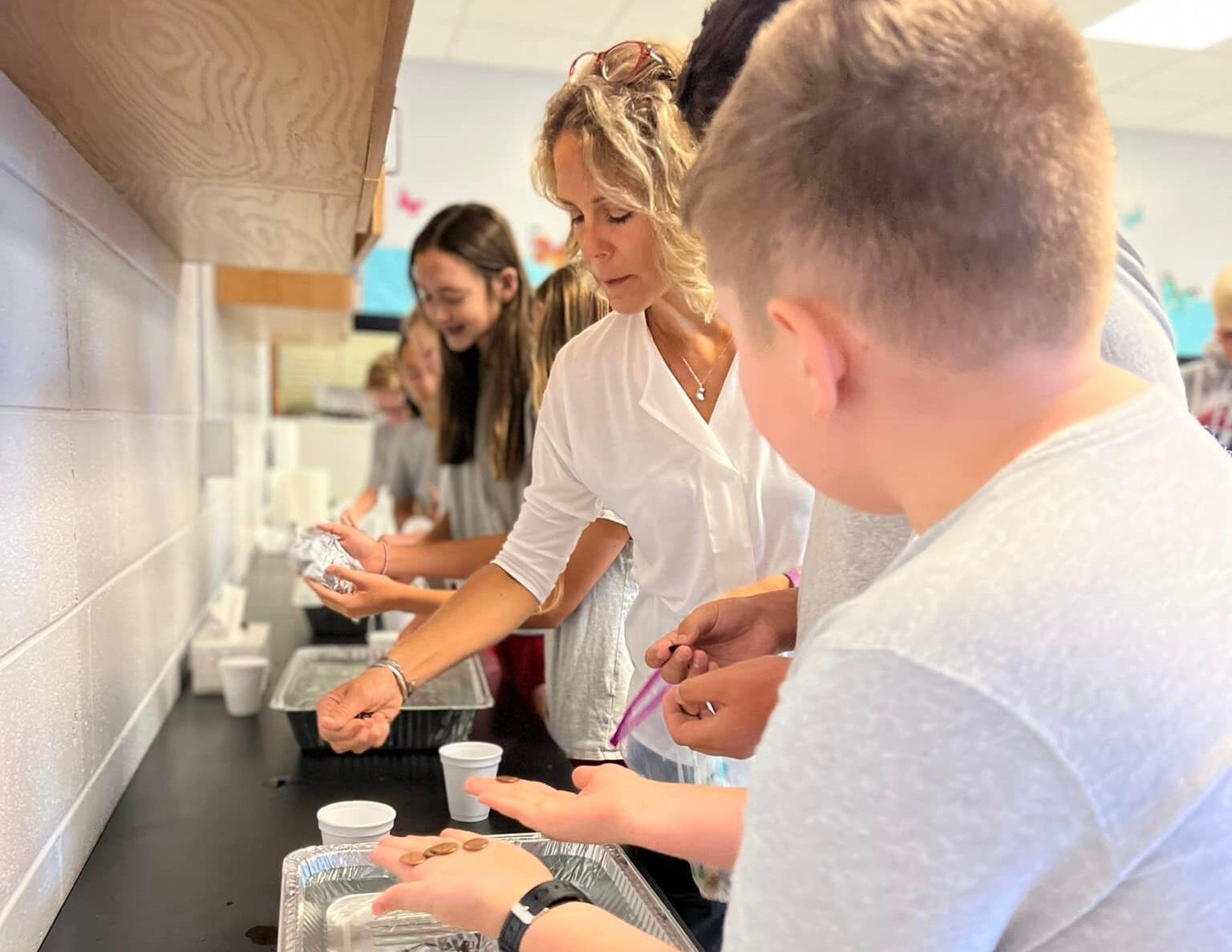Sixth Grade
The Sixth Grade curriculum closely follows the diocesan consensus curriculum guidelines in all subjects.
The Math curriculum follows the rigorous standards set by the diocese. Sixth grade math focuses on topics that support a strong Pre-Algebra curriculum. Students take either 6th grade Math or Pre-Algebra 7. 6th grade math focuses on strengthening the building blocks learned in grades 4 and 5, as well as introducing topics necessary for a successful Pre-Algebra and Algebra 1 experience. All middle school students follow a curriculum that leads to completion of Algebra 1 or Algebra 1/Geometry 1, and receive high school credit for successful completion of these courses.
The major components of the English curriculum include reading, grammar, composition, vocabulary development, and communicative skills. The concepts and skills taught are cumulative. Students are assigned summer reading prior to the onset of the school year and are encouraged to explore reading through various genres. Conventional standards of grammar are emphasized in the instruction of the parts of speech, mechanics, and usage. Students are engaged in the writing process and craft their writing in accordance with the three-part thesis. The vocabulary workshop systematically promotes expansion of vocabulary and aids in the preparation of vocabulary assessment in standardized testing. Students practice speaking and listening skills to enhance both verbal and written communication.
In Social Studies, 6th grade students will concentrate on ancient world civilizations giving them understanding in the development of societies and the evolution of cultures, as we know them today. They will study the Stone Age, ancient Egypt, China, India, Greece, Rome, and the Middle Ages. Map skills and geography skills will also be incorporated into the study of these ancient cultures.
Life Science is the focus in the sixth grade. There is a semester of investigation into the systems of the human body paying particular attention to the digestive, skeletal, muscular, circulatory and nervous systems. Students then continue their study of plant and animal cells and cellular processes. We also look at genetics and heredity. We finish up the year studying Ecosystems. All science classes perform hands-on activities and labs as part of every chapter of study.
In Religion, the 6th graders at SEES are beginning to delve more deeply into the “whys” of their faith. They will explore the Old Testament foundations of many aspects of Catholicism, as well as the New Testament events that include our Gospel accounts and the Letters which instruct us in Christian living. The Nicene Creed will be studied as well as memorized. Prayer in its different forms and for various purposes is an everyday occurrence; students are encouraged to pray together using words from their hearts as well as memorized and familiar prayers. Projects, discussion, and music are regular features of this class.
Seventh Grade
The Seventh Grade curriculum closely follows the diocesan consensus curriculum guidelines in all subjects.
The Math curriculum follows the rigorous standards set by the diocese. Seventh grade students take either Pre-Algebra or Algebra I. Pre-Algebra is a prerequisite for Algebra I and focuses on the skills necessary to prepare for more advanced math topics. Students taking Algebra 1 in 7th grade prepare to take a Geometry course in the 8th grade. In both classes students learn fundamental algebra skills needed to succeed in higher math classes. All middle school students follow a curriculum that leads to completion of Algebra 1 or Algebra 1/Geometry 1, and receive high school credit for successful completion of these courses.
The major components of the English curriculum include reading, grammar, composition, vocabulary development, and communicative skills. The concepts and skills taught are cumulative. Students are assigned summer reading prior to the onset of the school year and are encouraged to explore reading through various genres. Conventional standards of grammar are emphasized in the instruction of the parts of speech, mechanics, and usage. Students are engaged in the writing process and craft their writing in accordance with the three-part thesis. The vocabulary workshop systematically promotes expansion of vocabulary and aids in the preparation of vocabulary assessment in standardized testing. Students practice speaking and listening skills to enhance both verbal and written communication.
Seventh grade students study American History from the post-Civil War era to the present day. Topics include: the development of the West including the Indian Wars; the inventions of the early 20th century and industrialization; the growth of cities at the turn of the century; America becoming a world power; the roaring 20s; the Great Depression; World Wars I and II; the Cold War including Korea and Vietnam; the end of the Cold War and the Soviet Union; modern military conflicts and changes to society today. Current events are covered throughout the year.
In seventh grade, Physical Science focuses on Chemistry and Physics. Students spend a semester examining matter and learning basic chemistry. There is in-depth examination of atoms and the periodic table of elements. We spend another semester investigating physics. Students are engaged in the study of the effects of Newton’s Laws and the use of simple machines to examine the specific laws in action. All science classes perform hands-on activities and labs as part of every chapter of study.
Seventh grade students study Jesus in the New Testament with emphasis on the four Gospels, Acts of the Apostles, letters of Paul, the Catholic letters and the book of Revelation. They learn about the seven sacraments and the importance they play in our lives. Additionally, they are instructed in the principles of Catholic morality which help teenagers make important life choices. Focus is placed on different forms of prayer, aspects of the liturgical year, and the seasons of the Church.
Eighth Grade
The Eighth Grade curriculum closely follows the diocesan consensus curriculum guidelines in all subjects.
The Math curriculum follows the rigorous standards set by the diocese. Eighth grade students study either Algebra I or Geometry (upon successful completion of Algebra 1 in seventh grade). These are high school equivalent courses which transfer as high school credits. Students are required to take a rigorous Diocesan Algebra Exam or Geometry Exam at the end of the school year. Each year many of our students are accepted into specialty centers as a result of their test scores.
The major components of the English curriculum include reading, grammar, composition, vocabulary development, and communicative skills. The concepts and skills taught are cumulative. Students are assigned summer reading prior to the onset of the school year and are encouraged to explore reading through various genres. Conventional standards of grammar are emphasized in the instruction of the parts of speech, mechanics, and usage. Students are engaged in the writing process and craft their writing in accordance with the three-part thesis. The vocabulary workshop systematically promotes expansion of vocabulary and aids in the preparation of vocabulary assessment in standardized testing. Students practice speaking and listening skills to enhance both verbal and written communication
Eighth grade students study Civics, Government, and Economics. Topics include: foundations of citizenship and the election process; how American government was created with focus on the establishment of the Constitution and the Bill of Rights; the federal government with emphasis placed on the three branches; foundations of Economics and our government’s role in our economy. Current events are covered throughout the year.
Science focuses on Earth Science in eighth grade. Students spend time learning about geology…looking at rocks and minerals and various geologic features. Students’ studies then move out into space. They learn about the beginnings of our Solar System, the planets and the Sun. Weather is also studied in detail. All science classes perform hands-on activities and labs as part of every chapter of study.
Students are required to take a Religion class each year. Students receive a strong basis and appreciation for Catholic tradition and beliefs. They study Church history and Church laws as well as practice their faith on a daily basis. They are involved in a special outreaches throughout the year. Religion and Christian values are definitely priorities.



